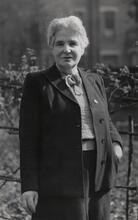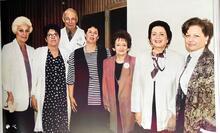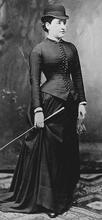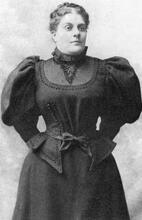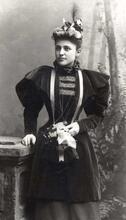Johanna Loeb
Johanna Loeb directed organizations such as the Home for Crippled Children, the Jewish Consumptive Relief Society of Chicago, and the Home for the Jewish Friendless. In 1890 she helped found the Jewish Training School, an innovative institution that offered vocational training, regular education, and home economics courses to poor and immigrant Jews. When Chicago was hit by economic downturn in the 1890s, she also opened soup kitchens throughout the city. She went on to help create what would become Chicago’s first Jewish Community Center and led the local chapter of the United Order of True Sisters, focusing their efforts away from national concerns and onto local charitable work like building Resthaven, a rest home for Jewish women and girls. Her career focused not on legislation or universal ideals, but on transforming individual lives by protecting people at their most vulnerable moments of life.
“In the death of Mrs. Johanna Loeb the Jewish Community of Chicago has lost one of its earnest and pioneer workers in the cause of charity. There are few of the Jewish charities of Chicago with which she was not identified in an active and efficient way. She was among the first who understood what personal service meant and she gave of her time and thought and energy willingly and cheerfully to help along those who had fallen by the way.” These words were written in 1917, at the time of Johanna Loeb’s death, in an editorial in the Sentinel, a Chicago Jewish weekly newspaper. Johanna Loeb was truly an outstanding Jewish social welfare worker in Chicago during the latter part of the nineteenth century and the first two decades of the twentieth century.
Early Life and Family
Johanna Unna was born in Rendsburg, Schleswig-Holstein, Germany, on May 25, 1844. In her early years, she was educated in Europe. She immigrated with her family to the United States in 1856 and eventually settled in Chicago, where she continued her basic education. She married Moritz Loeb, who emigrated from Bechtheim, Germany, and who died on April 10, 1892, at age fifty-two. They had four sons, Jacob M, Albert H., Julius, and Sidney. All of them were prominent in business and continued the family legacy of civic and communal service. Jacob was president of the Chicago Hebrew Institute, the predecessor of the Jewish Community Centers of Chicago, from 1912 to 1932, and was a board member and president for the Chicago Board of Education. Albert was the general manager of Sears, Roebuck and Company. Julius became vice president of George Kraft Company. Sidney was a successful real estate broker.
Jewish Charitable Organizations
Johanna Loeb served on many Chicago Jewish charitable organizations. She was a director for the Home for the Jewish Friendless, the German Old Peoples Home (Altenheim), the Home for the Crippled Children, the Jewish Consumptive Relief Society of Chicago, Resthaven, the Chicago Winfield Tuberculosis Sanitarium, the Josephine Club, and the Miriam Club. She also volunteered her time to the Baron Hirsch Woman’s Club, the National Council of Jewish Women, and Deborah Verein, and she was a member of Sinai Congregation. Like most of the leading female German Jewish communal workers who lived in Chicago around the turn of the century, she had a strong personal relationship with Dr. Emil Hirsch, the rabbi of Sinai Congregation from 1880 to 1923.
The Jewish Training School (1890–1921), an innovative school founded by the German Jews affiliated with Sinai Congregation, created a philosophy of education that combined vocational, domestic, and general education for the Eastern European Jews of Chicago. Loeb was a founding member of the Industrial School/Jewish Training School, serving on the board of directors for many years and also playing an active role in the selection of a building site.
After the World’s Columbian Exposition of 1893, Chicago suffered a period of financial depression. Loeb, as president of a society of ladies affiliated with the Central Unterstützungsverein [support association], opened numerous soup kitchens to care for Chicago’s destitute.
At the turn of the century, the Chicago Jewish community recognized the need to help immigrants become accustomed to American life by establishing a Jewish communal institution. Loeb was an active participant in the women’s auxiliary of the Chicago Hebrew Institute, which assisted the men in planning, development, and fund-raising. This organization eventually became the Jewish Community Centers.
During her first term as president of the Johanna Lodge No. 9, United Order of True Sisters (UOTS), Loeb led her chapter away from the platform of the national organization. A new focus of helping the Jewish disadvantaged was instituted, and Loeb served three terms as president. She was also instrumental in the founding of two other lodges for the UOTS—the Sarah Greenebaum Lodge No. 16 and the Lincoln Lodge. The Sarah Greenebaum Lodge supported Resthaven, a home for convalescing Jewish women and girls.
The history of the Jewish Federation of Metropolitan Chicago can be traced back to several organizations. One of these institutions, the United Hebrew Charities (1888–1900), was an important part of Loeb’s life. She was the first woman appointed to its board of directors. She was also a member of the ladies’ auxiliary committee.
Death and Legacy
Johanna Loeb died in Chicago on October 22, 1917, and was buried next to her husband in Rose Hill Cemetery. She represents the beginning of an era in which Jewish women in Chicago devoted their time and money exclusively to Jewish communal service. Her charitable work within the Jewish community highlights the limitations that were placed on women and the role that separate women’s philanthropic groups and women’s auxiliaries played in Jewish American society during her lifetime.
AJYB 7 (1905–1906): 82, and 20 (1918–1919): 229.
Bregstone, Philip P. Chicago and Its Jews (1933).
The Chicago Jewish Community Blue Book (1918).
Gutstein, Morris A. A Priceless Heritage (1953).
Industrial School/Jewish Training School. Minutes. Spertus Institute, Chicago.
Jewish Community Center. Archival collection. Chicago Historical Society.
Jewish Federation of Metropolitan Chicago. Archival collection. Spertus Institute.
Meites, Hyman L., ed. History of the Jews of Chicago (1990).
“The New Soup Kitchen.” Illinois Staats Zeitung, December 19, 1893, 5.
Obituary. Sentinel, October 26, 1917.
Obituary of Moritz Loeb. Reform Advocate, April 16, 1892, 212.
Reis, Nannie. “In the World of Jewish Womankind.” Reform Advocate, October 27, 1917, 273+.
Stein, Oswald. Leading Women in Social Service (1914?).

